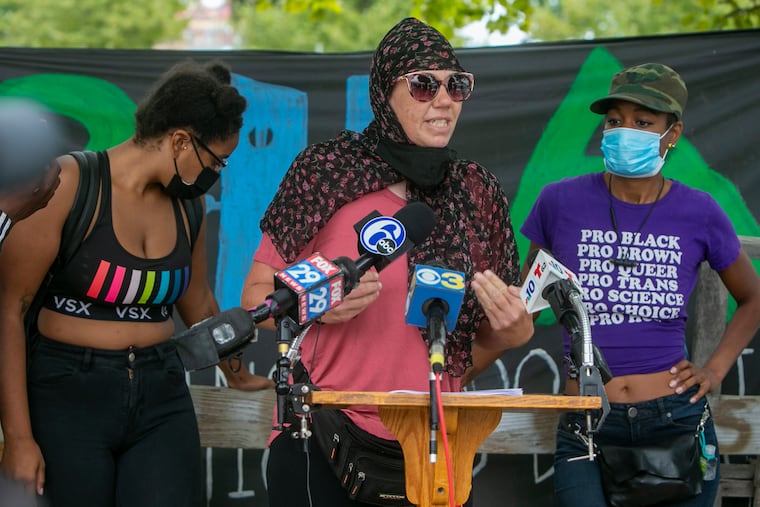Biden’s plan could be disastrous for low-income homeowners in Philly | Opinion
Philadelphia must center our zoning policy in racial justice and community control.

Last month, the Biden administration released its American Jobs Plan. One of its priorities will be to incentivize jurisdictions to prohibit “exclusionary zoning laws,” like minimum lot sizes and parking and single-family housing requirements. As a city, we must be wary because this proposal could negatively affect Philadelphia’s low-income homeowners by igniting development in gentrifying neighborhoods.
Books like Richard Rothstein’s Color of Law cite exclusionary zoning laws as a primary reason for the urban housing crisis. Suburban jurisdictions often used exclusionary zoning to stop the construction of multifamily apartment buildings, limiting housing options for low-income people. States and cities have responded by reforming outdated zoning laws promoting density. In recent years, Minneapolis and Oregon banned single-family housing requirements and others jurisdictions are considering following suit.
» READ MORE: The case for infrastructure spending? Our future depends on it | Opinion
Historically, “not in my backyards,” or NIMBYs, have been characterized as wealthy opportunity hoarders. As a response, “yes in my backyards,” or YIMBYs, have advocated for more density and residential infill projects. However, in Philadelphia, many NIMBYs are low-income homeowners advocating for exclusionary zoning requirements to stop demotions and protect their historic neighborhoods. City Council members have used councilmanic prerogative to stop development where possible. Council President Darrell L. Clarke recently banned roof decks and certain building materials from being used in Strawberry Mansion, systematically stopping new construction. Councilmember Kenyatta Johnson attempted to do something similar, banning balconies and bay windows in Point Breeze’s hot housing market. Without councilmanic prerogative, developers would be able to build by-right and override local opposition.
Local opposition is a valid response to a rapidly changing neighborhood. In February, the Reinvestment Fund released a report discussing neighborhoods where “involuntary price-based displacement” was occurring for Black and Hispanic residents. The report pinpointed Point Breeze and parts of North Philly as high risk for displacement. When those neighbors fight for zoning regulations, which may seem outlandish or ridiculous, it is in response to gentrification pressures.
Earlier this year, Johnson was criticized for carving out the 19146 zip code in the new zoning legislation. However, gentrification in Point Breeze merits some regulation due to the destruction of a low-income community with a high rate of Black homeownership. New multifamily developments with only one-bedroom units and no parking will not bring more low-income families to Point Breeze. Councilmanic prerogative now allows for the councilperson to negotiate community benefits with developers. Council members introduced a bill requiring such negotiations early last year, but no hearings were held on the issue.
Ultimately, councilmanic prerogative is not the issue. We have to center our zoning policy in racial justice and community control. If it can be used to mitigate the harms of gentrification in historically low-income neighborhoods, then that should be its goal.
Until then, we should support a statewide law requiring that large cities and counties make a regional housing plan, like in California. Pennsylvania does not mandate such coordination, having each jurisdiction employ vastly different strategies to meet their own specific goals. Without planning, the housing market will build mostly market-rate single-family homes or condos and otherwise leave properties vacant while unhoused people sleep on the streets.
» READ MORE: Philadelphia has an affordable-housing crisis. Biden’s platform has a simple, but radical, solution. | Inga Saffron
Lastly, the focus on “smart growth” and density makes it more difficult for low-income people to have large families. Essentially, it sends a message that problematizes the choices of Black and Hispanic poor people, stating that they should have fewer children, a wholly racist and classist idea. We must support building multifamily units in communities that have historically used zoning to stop its construction. While simultaneously, we must protect and maintain neighborhoods with high rates of low-income Black and Hispanic homeownership.
The Biden administration is suggesting that they will have a competitive grant program that will stipulate the end to exclusionary zoning practices. Philadelphia will most likely apply because it needs the resources. However, one size does not fit all. Without more precision, it could be the final nail in the coffin for Philadelphia’s low-income Black homeowners.
Sterling Johnson is a doctoral student at Temple University and a housing and homelessness advocate. Jennifer Bennetch is a lifelong Philadelphia resident and founder of #OccupyPHA.